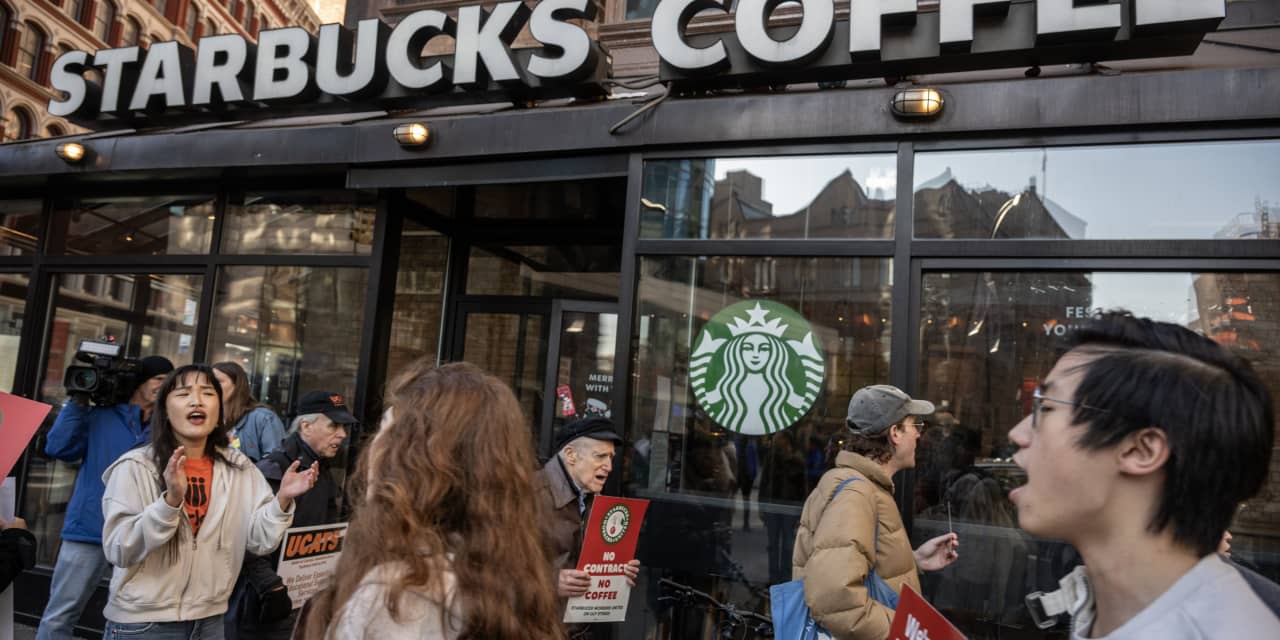Over the years,
Starbucks
has defended its stance on various hot-button issues, from its holiday cup design to the company’s approach to its in-store décor during Pride month.
But perhaps few issues have been as divisive and tricky to navigate as responding to the Israel-Hamas war—especially when its response has become entwined with the company’s continuing unionization conflicts.
The past three months have been volatile ones for the company—and the stock. Shares are up 5% since Oct. 7, when Hamas attacked Israel, underperforming the
S&P 500’s
10% gain. Since fighting broke out, the coffee company has been at the receiving end of boycott calls from supporters on both sides of the conflict.
Although the stock gained significantly following the company’s Nov. 2 earnings and investor day, it then fell into a 12-day slump spurred by analysts’ concerns that sales and foot traffic were slowing—and speculation that the boycott calls were behind the decline.
A
Starbucks
spokesman said that while the company can’t comment on specific sales numbers, it hadn’t seen any evidence of boycotts in its stores. It has, however, seen an uptick in vandalism and heated encounters with employees at its stores, he said.
Misrepresentations about the company’s stance on the conflict are at the heart of the turmoil, wrote CEO Laxman Narasimhan in a letter to employees on Tuesday. And as the new year rolls around, he wants to set the record straight.
“While I am grateful for so much, I am concerned about the state of the world we live in,” Narasimhan wrote in an employee letter that was reviewed by Barron’s. “There are conflicts in many parts. It has unleashed violence against the innocent, hate and weaponized speech, and lies—all of which we condemn.”
“Our stance is clear,” he added. “We stand for humanity.”
Starbucks’ issues began shortly after the attack in October, when the Starbucks Workers United union expressed “solidarity with Palestine” in a now-deleted post on X—prompting the first wave of boycott calls against the company, including from the Orthodox Jewish Chamber of Commerce.
Starbucks put out a statement disagreeing “with the views expressed by Workers United” and condemning acts of terrorism. It also filed a legal complaint against the union, asking it to stop using the company’s name, logo, and intellectual property.
Workers United filed a claim of its own with the National Labor Relations Board, arguing that the company had shared a list of unionized stores with the Orthodox Jewish Chamber of Commerce “for the purpose of initiating a boycott of unionized stores.” In a separate statement, the union said the company was using the crisis to “make false statements” against the organization.
The claims that the company encouraged boycotts of unionized stores were incorrect, a company spokesman said.
This is the latest chapter in what has been a bitter fight over the unionization process. Workers United went on a one-day strike in November. And then last week, a third-party report commissioned by Starbucks in response to shareholder pressure found that while the coffee chain didn’t have an “anti-union playbook,” it was unprepared for the unionization push that started in 2021. Earlier in December, Narasimhan had sent a letter reaffirming the company’s “hopeful goal” to reach agreements with the union in 2024.
On Tuesday, Narasimhan reiterated a conciliatory sentiment.
“It is time to restitch the fabric of the green apron for all partners,” he wrote. “It is during times of conflict and pain when it is most important to come together. I am realistic that it will take time. But I know it will happen.”
The union was more skeptical.
“Starbucks claims to want a new relationship with workers and our union, but actions speak louder than words,” said Michelle Eisen, a Starbucks Workers United member, in a statement to Barron’s.
Write to Sabrina Escobar at [email protected]
Read the full article here




